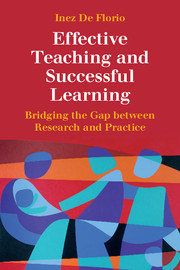Book contents
- Frontmatter
- Epigraph
- Contents
- Preface
- Introduction
- 1 Main Features of Scientific Research on Education
- 2 Important Types of Scientific Research on Education
- 3 Main Features of Evidence-based Research on Education
- 4 Meta-Analyses on Education
- 5 A Synthesis of Over 800 Meta-Analyses Relating to Achievement
- 6 Scaffolding Effective Teaching and Successful Learning
- 7 Planning and Starting the Lesson
- 8 Presenting Knowledge and Skills – Assertive Questioning
- 9 Guided and Independent Practice
- 10 Cooperative and Project-based Learning
- 11 Feedback – Reciprocal and Informative
- Concluding Remarks: Standards Need More Evidence
- References
- Index
3 - Main Features of Evidence-based Research on Education
Published online by Cambridge University Press: 05 June 2016
- Frontmatter
- Epigraph
- Contents
- Preface
- Introduction
- 1 Main Features of Scientific Research on Education
- 2 Important Types of Scientific Research on Education
- 3 Main Features of Evidence-based Research on Education
- 4 Meta-Analyses on Education
- 5 A Synthesis of Over 800 Meta-Analyses Relating to Achievement
- 6 Scaffolding Effective Teaching and Successful Learning
- 7 Planning and Starting the Lesson
- 8 Presenting Knowledge and Skills – Assertive Questioning
- 9 Guided and Independent Practice
- 10 Cooperative and Project-based Learning
- 11 Feedback – Reciprocal and Informative
- Concluding Remarks: Standards Need More Evidence
- References
- Index
Summary
The main purpose of this chapter is to provide an introduction to evidence-based teaching and learning in order to enable (prospective) teachers and education professionals to make informed and reasoned decisions about the findings of evidence-based educational research. As education is multilayered and complex (see Section 1.5), nobody should expect recipes to follow. Practices of teaching and learning cannot be based on one single approach to research. There are no ready-made examples, but teachers who have gained insights into evidence-based education undoubtedly are more adequately prepared for enabling their students to reach the desired learning outcomes.
EVIDENCE-BASED MEDICINE AND EVIDENCE-BASED EDUCATION
First, I shall describe some important reasons that led to the use of evidence-based approaches in medicine. It was not long until there was a paradigm shift to evidence-based research into many fields of the social sciences, including teaching and learning. As a consequence of the success of empirical evidence in medicine, health care, agriculture, and management, evidence-based education gathered momentum during the past three decades.
As early as 1793, G. Fordyce, a Scottish physician, published an article entitled An Attempt to Improve the Evidence of Medicine in a specialized journal (Medical and Chirurgical Transactions). Even though there had been various attempts to establish evidence-based methods in medicine since the beginning of the twentieth century, the official introduction of evidence-based medicine did not come until the 1990s. The foundation of the Cochrane Collaboration in 1993, named after Cochrane, a British professor of epidemiology who is considered the founder of evidence-based medicine, was a milestone. In 1972 Cochrane published the book Effectiveness and Efficiency: Random Reflections on Health Services, the influence of which goes far beyond medicine (see Section 3.3).
The Cochrane Collaboration is an independent organization whose motto is: Working together to provide the best evidence for health care. More than 31,000 volunteers in more than 120 countries conduct systematic reviews of RCTs of medical interventions published in the Cochrane Library. Information about medical research is thus gathered in a systematic way in order to provide health professionals, patients, policy makers, and the wider public with all information available about health interventions.
At the beginning of the new millennium, an organization similar to the Cochrane Collaboration was founded at the University of Pennsylvania, named after Campbell, an U.S. psychologist.
- Type
- Chapter
- Information
- Effective Teaching and Successful LearningBridging the Gap between Research and Practice, pp. 45 - 62Publisher: Cambridge University PressPrint publication year: 2016



